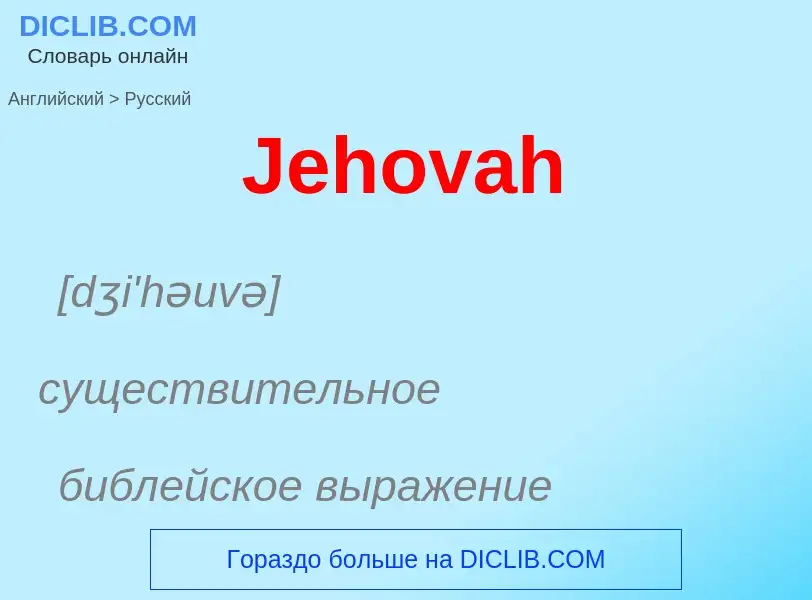ترجمة وتحليل الكلمات عن طريق الذكاء الاصطناعي ChatGPT
في هذه الصفحة يمكنك الحصول على تحليل مفصل لكلمة أو عبارة باستخدام أفضل تقنيات الذكاء الاصطناعي المتوفرة اليوم:
- كيف يتم استخدام الكلمة في اللغة
- تردد الكلمة
- ما إذا كانت الكلمة تستخدم في كثير من الأحيان في اللغة المنطوقة أو المكتوبة
- خيارات الترجمة إلى الروسية أو الإسبانية، على التوالي
- أمثلة على استخدام الكلمة (عدة عبارات مع الترجمة)
- أصل الكلمة
Jehovah - ترجمة إلى الروسية
[dʒi'həuvə]
существительное
библейское выражение
Иегова
[tetrə'græmətɔn]
существительное
общая лексика
слово из четырёх букв
религия
Иегова
تعريف
ويكيبيديا

Jehovah () is a Latinization of the Hebrew יְהֹוָה Yəhōwā, one vocalization of the Tetragrammaton יהוה (YHWH), the proper name of the God of Israel in the Hebrew Bible/Old Testament. The Tetragrammaton יהוה is considered one of the seven names of God in Judaism and a form of God's name in Christianity.
The consensus among scholars is that the historical vocalization of the Tetragrammaton at the time of the redaction of the Torah (6th century BCE) is most likely Yahweh. The historical vocalization was lost because in Second Temple Judaism, during the 3rd to 2nd centuries BCE, the pronunciation of the Tetragrammaton came to be avoided, being substituted with Adonai ("my Lord"). The Hebrew vowel points of Adonai were added to the Tetragrammaton by the Masoretes, and the resulting form was transliterated around the 12th century CE as Yehowah. The derived forms Iehouah and Jehovah first appeared in the 16th century.
The vocalization of the Tetragrammaton Jehovah was first introduced by William Tyndale in his translation of Exodus 6:3, and appears in some other early English translations including the Geneva Bible and the King James Version. The United States Conference of Catholic Bishops states that in order to pronounce the Tetragrammaton "it is necessary to introduce vowels that alter the written and spoken forms of the name (i.e. "Yahweh" or "Jehovah")." Jehovah appears in the Old Testament of some widely used translations including the American Standard Version (1901) and Young's Literal Translation (1862, 1899); the New World Translation (1961, 2013) uses Jehovah in both the Old and New Testaments. Jehovah does not appear in most mainstream English translations, some of which use Yahweh but most continue to use "Lord" or "LORD" to represent the Tetragrammaton.

![KJV}}</ref> (''[[King James Version]]'') KJV}}</ref> (''[[King James Version]]'')](https://commons.wikimedia.org/wiki/Special:FilePath/Authorized King James Version.png?width=200)


![Jehovah in [[King James Bible]] 1853 Isaiah 12:2 Jehovah in [[King James Bible]] 1853 Isaiah 12:2](https://commons.wikimedia.org/wiki/Special:FilePath/King James Bible-Isaiah 12 2 Jehovah.jpg?width=200)

![vowel points]] shown in red vowel points]] shown in red](https://commons.wikimedia.org/wiki/Special:FilePath/Tetragrammaton-related-Masoretic-vowel-points.png?width=200)
![Septuagint manuscript]] [[4Q120]] Septuagint manuscript]] [[4Q120]]](https://commons.wikimedia.org/wiki/Special:FilePath/4Q120 frg20 with Divine Name.jpg?width=200)
![Tympanum]] of the Roman Catholic [[Basilica of St. Louis, King of France]] in Missouri Tympanum]] of the Roman Catholic [[Basilica of St. Louis, King of France]] in Missouri](https://commons.wikimedia.org/wiki/Special:FilePath/BASILICA OF ST LOUIS KING OF FRANCE MISSOURI USA Near the Gateway Arch TETRAGRAMMATON.jpg?width=200)
![paleo-Hebrew]] script on [[Greek Minor Prophets Scroll from Nahal Hever]] paleo-Hebrew]] script on [[Greek Minor Prophets Scroll from Nahal Hever]]](https://commons.wikimedia.org/wiki/Special:FilePath/Lxx Minorprophets.gif?width=200)
![A tetractys of the letters of the Tetragrammaton adds up to 72 by [[gematria]]. A tetractys of the letters of the Tetragrammaton adds up to 72 by [[gematria]].](https://commons.wikimedia.org/wiki/Special:FilePath/Tetragrammaton-Tetractys.png?width=200)
![[[Petrus Alphonsi]]'s early 12th-century Tetragrammaton-Trinity diagram, rendering the name as "IEVE", which in contemporary letters is "IEUE". [[Petrus Alphonsi]]'s early 12th-century Tetragrammaton-Trinity diagram, rendering the name as "IEVE", which in contemporary letters is "IEUE".](https://commons.wikimedia.org/wiki/Special:FilePath/Tetragrammaton-Trinity-diagram-12thC.jpg?width=200)

![Tetragrammaton at the Fifth Chapel of the [[Palace of Versailles]], France. Tetragrammaton at the Fifth Chapel of the [[Palace of Versailles]], France.](https://commons.wikimedia.org/wiki/Special:FilePath/Tetragrammaton at 5th Chapel of the Palace of Versailles France.jpg?width=200)
![Tetragrammaton by [[Francisco Goya]]: "The Name of God", YHWH in triangle, detail from fresco ''[[Adoration of the Name of God]]'', 1772 Tetragrammaton by [[Francisco Goya]]: "The Name of God", YHWH in triangle, detail from fresco ''[[Adoration of the Name of God]]'', 1772](https://commons.wikimedia.org/wiki/Special:FilePath/YHWH Goya.jpg?width=200)
![YHWH in one of the [[Lachish letters]] YHWH in one of the [[Lachish letters]]](https://commons.wikimedia.org/wiki/Special:FilePath/YHWH on Lakis Letters (no. 2).jpg?width=200)

